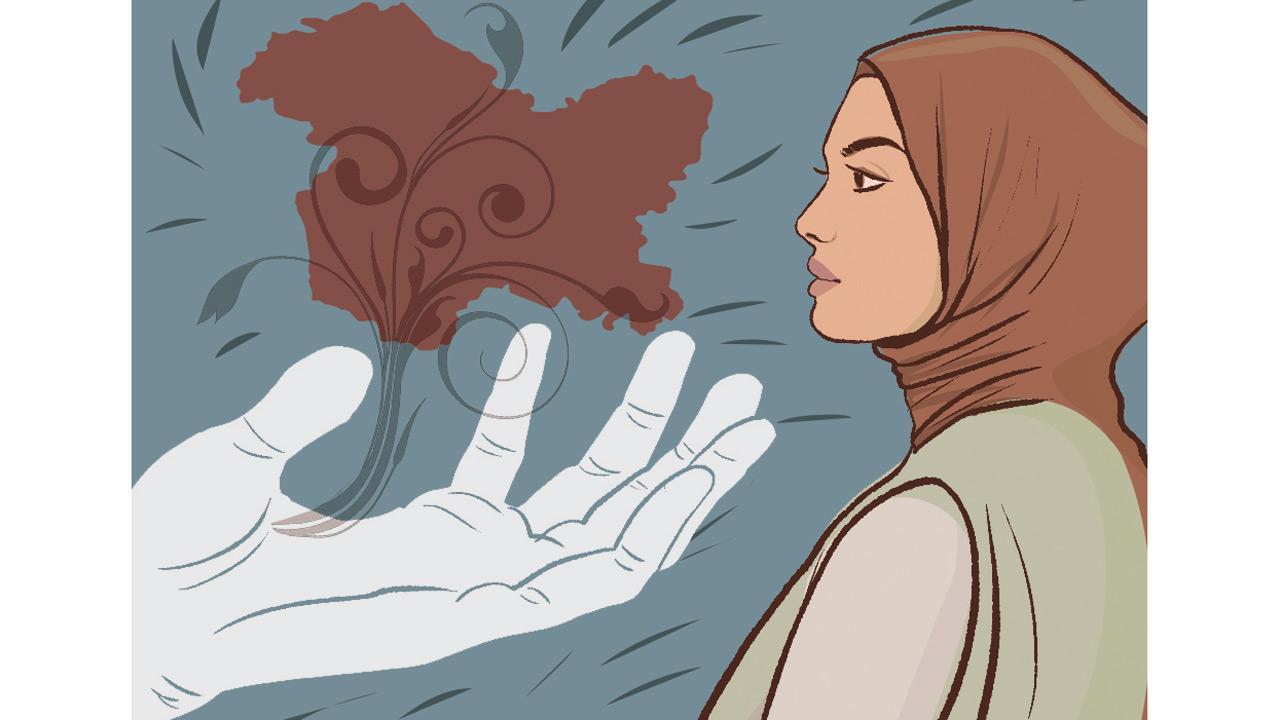And not further embattle, through this polarisation, women within the community who do not wish to wear hijab. Compassion is an essential practice, of justice

Illustration/Uday Mohite
![]() Let us not talk about hijab today. Let us talk about compassion.
Let us not talk about hijab today. Let us talk about compassion.
ADVERTISEMENT
Let us ask the hard un-hashtaggable questions about what compassion looks like when you create laws, systems, rules, rights and relationships. Reason and rationality have long been offered as some higher state of being. But reason and rationality, whatever your ideology, can sometimes be a kind of veil too, for all kinds of feelings. Reasoning about uniforms and practices can be veils for unabashed communal persecution, for burning insecurity about majoritarian power that feels it must assert itself over and over.
Some videos circulated after the release of the film The Kashmir Files, show young men rabble rousing in the cinema, worried that while they are watching movies, Muslims are procreating and they should instead acquire Muslim women and procreate with them (not sure what this will do for the box office but chalo, what’s so great about reason). The film, like other works before it—this includes liberal ones—uses the idea of reality, which comes with the dowry of rationality and the implication that realism is truth, to create a veil inside which majoritarians may whip themselves into a quivering heap of manufactured humiliation and resentment and provide a rationale for communal hate and violence, rather than create compassion for Kashmiri Pandits. Compassion is an essential practice of art (but not propaganda).
If we could find such a language, it would be easy to understand that a young woman in one kind of uniform (cultural, like hijab), is not so different from one in another kind of uniform (‘rational’ school uniform). It would seem reasonable to help young women who have managed to wrest some freedom and mobility for themselves, to expand that freedom, rather than constrict it. And not further embattle, through this polarisation, women within the community who do not wish to wear hijab. Compassion is an essential practice, of justice.
In travel guides to India, there is often a section on how women from other countries should dress to avoid harassment. But you don’t have to be a woman from another country to know all about that—that constant awareness of what you can wear without being harassed, (or wear, but bear harassment) or be dismissed, not taken seriously, not be given a promotion or simple respect. At 24, I acquired a vividly patterned skirt, John Lennon glasses and red lipstick. As I walked, pleased with myself, alongside the man of the moment, he said to me, “You think you are looking very nice. But you’re looking really loud.”
I hadn’t asked. In 2002, while making a film called Unlimited Girls, some young women, who were the first generation to go to a co-ed college in their Haryana town, told me chilling tales about the sexual harassment they were routinely subjected to by the male students in their college. But they did not want to complain, because “then parents will make us sit at home. They’ll say you insisted on going to a co-ed college and now look at what’s happened. Do a correspondence course.” When I asked the boys, they provided elaborate rationales of how girls dress. No woman should feel too smug, that the control of what Muslim women wear is not linked to the control of all women. Compassion is an essential practice of solidarity, and freedom.
Paromita Vohra is an award-winning Mumbai-based filmmaker, writer and curator working with fiction and non-fiction. Reach her at paromita.vohra@mid-day.com
 Subscribe today by clicking the link and stay updated with the latest news!" Click here!
Subscribe today by clicking the link and stay updated with the latest news!" Click here!







